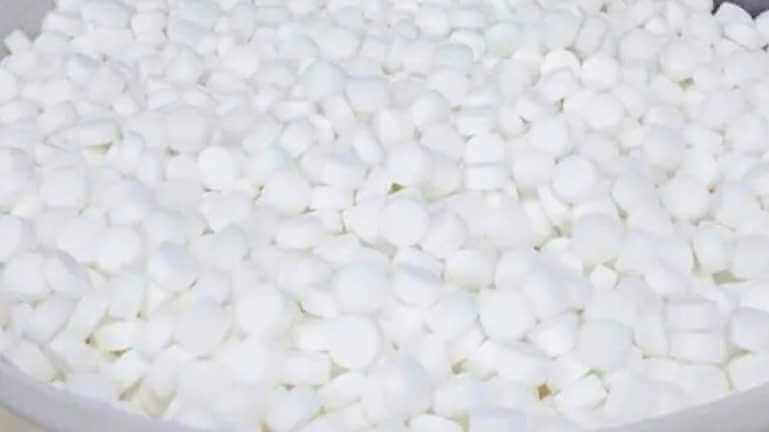Are you looking to optimize the performance and longevity of your water softener? Selecting the right salt is crucial. With numerous options available, it can be challenging to determine the best fit for your needs. In this guide, we’ll delve into the various types of salt for water softeners, recommend the top choice, explore different brands, and address specific considerations such as water with iron.
What type of salt is best for a water softener?
Evaporated salt pellets are the best option for optimal water softener performance due to their high purity and easy dissolution.
Key Takeaways:
- The optimal performance and longevity of water softeners depend on selecting the right salt.
- Evaporated salt pellets are recommended for their high purity and easy dissolution.
- Considerations like water hardness and iron content should guide your salt selection.
- Reputable brands like Morton, Diamond Crystal, and Nature’s offer quality options.
- Regular maintenance and proper filtration for iron-rich well water are essential for optimal performance.
Types of Salt for Water Softeners:
- Sea Salt: Widely available and affordable, sea salt is a natural option. While relatively pure, its consistency may vary, impacting its effectiveness.
- Rock Salt: Mined from natural deposits, rock salt is less pure and prone to causing issues like salt bridges and tank clogs. Its mining process also raises environmental concerns.
- Potassium Chloride: Though technically not salt, potassium chloride serves as an alternative for those with low-sodium diets. It acts more as a conditioner than a softener and tends to be more expensive.
- Evaporated Salt Pellets: Considered the top choice by many manufacturers, evaporated salt pellets undergo a distillation process to achieve high purity. They dissolve easily, minimizing residue and requiring less maintenance.
What is the best water softener salt?
While all options have their merits, evaporated salt pellets stand out as the preferred choice for optimal water softener performance. Their purity, ease of dissolution, and minimal maintenance requirements make them highly efficient. Despite their slightly higher cost, the long-term benefits in terms of system longevity and reduced upkeep expenses justify the investment.
Best Salt for Water Softeners: Pellets or Crystals?
When comparing pellets and crystals, pellets are superior due to their residue-free dissolution, preventing issues like clogging and bridging. While crystals may be more affordable, they’re best suited for specific systems and may not perform as well with normal to high water usage.
Water Softener Salt Brands
Several reputable brands offer quality salt options for water softeners
- Morton is known for its diverse product range, including evaporated salt and potassium chloride.
- Diamond Crystal: comparable to Morton, with convenient dual-handle bags for easy refills.
- Nature’s Own: Ideal for customers preferring potassium chloride.
- Windsor Salt offers cost-effective options without compromising quality.
Water Softener Salt Price Comparison
While price is a consideration, it’s essential to weigh it against the overall value and performance. Windsor salt often emerges as the most economical choice, but factors like purity and efficiency should also influence your decision.
Best Water Softener Salt for Well Water with Iron
For those dealing with well water containing iron, it’s crucial to address this issue separately from water softening. Utilizing the right filtration system to remove iron is key, as water softeners primarily target hardness minerals.
Conclusion
Selecting the best salt for your water softener involves considering purity, dissolution properties, and long-term benefits. By choosing high-quality salt and maintaining your system properly, you can ensure optimal water-softening performance and prolong its lifespan.
Frequently Asked Question
What type of salt is best for my water softener?
The best type of salt for your water softener is evaporated salt pellets. These pellets undergo a distillation process that ensures high purity, leading to efficient water softening and reduced maintenance requirements.
Can I use sea salt or rock salt in my water softener?
While sea salt and rock salt are options for water softening, they are not recommended due to their lower purity levels. Sea salt may vary in purity, while rock salt can contribute to issues such as salt bridges and tank clogs. It’s best to opt for evaporated salt pellets for optimal performance.
Is potassium chloride a suitable alternative to traditional water softener salt?
Potassium chloride can serve as an alternative for individuals with sodium intake restrictions. However, it functions more as a conditioner than a softener and may be less effective in areas with high water hardness. Additionally, it tends to be more expensive than traditional salt options.
How often should I add salt to my water softener?
The frequency of salt addition to your water softener depends on factors such as water usage and system capacity. As a general guideline, checking the salt level at least once a month and refilling the brine tank as needed to ensure uninterrupted softening is recommended.
Can I use salt crystals instead of pellets in my water softener?
While salt crystals may be more affordable, they are not as effective as pellets, especially in systems with normal to high water usage. Pellets dissolve more easily without leaving residue, preventing issues like clogging and bridging in the brine tank. For optimal performance, it’s advisable to use evaporated salt pellets.

Ross Walters, an Electrical supplies and Water Appliances specialist, shares his extensive expertise on top platforms. With a focus on empowering professionals and enthusiasts, Ross delivers up-to-date insights and practical advice. His commitment to staying abreast of industry trends establishes him as a trusted source for navigating the complexities of electrical systems and water appliances.

